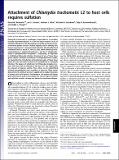Attachment of Chlamydia trachomatis L2 to host cells requires sulfation
Author(s)
Ploegh, Hidde; Rosmarin, David M.; Carette, Jan E.; Olive, Andrew J.; Starnbach, Michael N.; Brummelkamp, Thijn R.; ... Show more Show less
DownloadPloegh-2012-Attachment of Chlamydia trachomatis L2 to host cells requires.pdf (729.0Kb)
PUBLISHER_POLICY
Publisher Policy
Article is made available in accordance with the publisher's policy and may be subject to US copyright law. Please refer to the publisher's site for terms of use.
Terms of use
Metadata
Show full item recordAbstract
Chlamydia trachomatis is a pathogen responsible for a prevalent sexually transmitted disease. It is also the most common cause of infectious blindness in the developing world. We performed a loss-of-function genetic screen in human haploid cells to identify host factors important in C. trachomatis L2 infection. We identified and confirmed B3GAT3, B4GALT7, and SLC35B2, which encode glucuronosyltransferase I, galactosyltransferase I, and the 3′-phosphoadenosine 5′-phosphosulfate transporter 1, respectively, as important in facilitating Chlamydia infection. Knockout of any of these three genes inhibits Chlamydia attachment. In complementation studies, we found that the introduction of functional copies of these three genes into the null clones restored full susceptibility to Chlamydia infection. The degree of attachment of Chlamydia strongly correlates with the level of sulfation of the host cell, not simply with the amount of heparan sulfate. Thus, other, as-yet unidentified sulfated macromolecules must contribute to infection. These results demonstrate the utility of screens in haploid cells to study interactions of human cells with bacteria. Furthermore, the human null clones generated can be used to investigate the role of heparan sulfate and sulfation in other settings not limited to infectious disease.
Date issued
2012-06Department
Massachusetts Institute of Technology. Department of Biology; Whitehead Institute for Biomedical ResearchJournal
Proceedings of the National Academy of Sciences of the United States of America
Publisher
National Academy of Sciences (U.S.)
Citation
Rosmarin, D. M. et al. “Attachment of Chlamydia Trachomatis L2 to Host Cells Requires Sulfation.” Proceedings of the National Academy of Sciences 109.25 (2012): 10059–10064. © 2012 National Academy of Sciences
Version: Final published version
ISSN
0027-8424
1091-6490